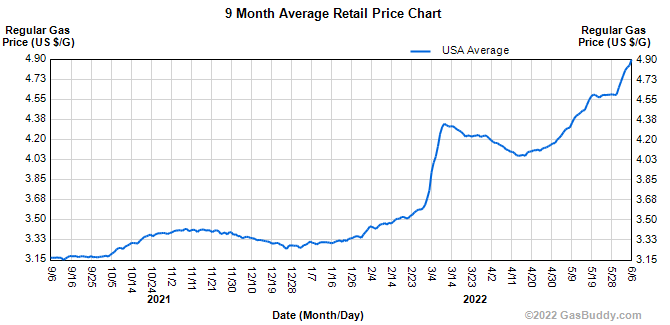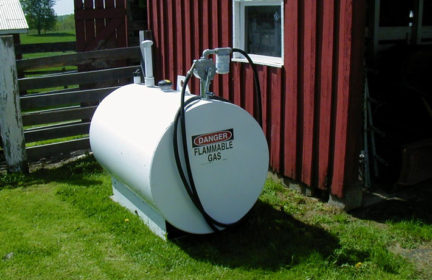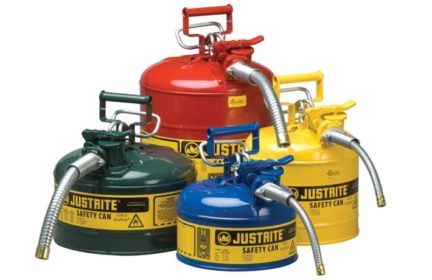How has rising gas prices influenced you?
I really thought that we would see a small spike in gas prices with the conflict in Ukraine and then level out, but it doesn’t seem to stop.
Chart from Gasbuddy.com and is the national average.
How has the rising gas prices affected everyone? Are you driving less? Have you bought a more fuel efficient vehicle? Did you switch jobs to commute less?
I’ve been driving much less often and combine all my errands into one trip so that I don’t have to go out. It changes the way I prepare because I need to store more items on hand and sometimes just go without something like bread for a couple days until I build up enough reasons to go out again. I don’t visit family or go out for entertainment as much as I used to either. It feels like I am back under quarantine and is starting to affect my mental health like during covid.
I also rotate through my stored gas cans every 6 months so I don’t have to buy fuel stabilizer, but maybe it would be cheaper to stabilize the fuel because 6 months from now it might be much higher.
Stupid me is going to laugh and be wish for $4.90 gas in 2 months time when it’s then around $6.25 or something.
-
Comments (14)
-
Pops - June 7, 2022
Hi, Conrad. I personally think the transition from fossils is the most difficult and most important prep that we aren’t doing. The average American travels around 14-15 thousand miles per year and I have no idea the total number of miles all the stuff they buy travels. That use is so ubiquitous as to be virtually invisible.
The long and short of it is that fossil carbon is finite, when it’s burned, it’s gone. We burn nearly 4,200,000,000 gallons of oil… per day. Everything in your sight depends on it, diesel in particular. It is inevitable that at some point along the oil age timeline production has or will reach a maximum rate. This is simply because we, logically, use the easiest to find and extract oil first, leaving the harder, slower for last. Flow rate is what matters, not how much is left.
In the 2010s, unprecedented government stimulus enabled the money pit of the fracking boom. Fracked oil and tar-sand are the only “flavors” that increased in volume since the ’00s. We are reaping the rewards of that stimulus now in inflation, right at the same time that upstream oil investment has fallen by half.
Maybe the maximum flow was in 2018, maybe it will be 2028, but in any case I’m not planning on cheaper oil, gas, electricity.
Unaffordable fuel, not to mention “Out of Gas” signs, are things no BOB or bassment supply can prepare us for, which is why, I think, it is not often talked about. Not by preppers, not by pols, not by anyone. It is the ultimate normalcy bias blindness. There is no shopping list of cool toys to fiddle with while fantasizing about Rambo.
You have some good ideas, Conrad. We should all actually think about how life would be if energy consumed 10-20% of our budget. things like getting rid of your car commute! Weatherize and economize your home, build personal infrastructure, clear debt.
-
MarcusAurelius - June 10, 2022
Good comment, @Pops.
I’d like to add that most of the built environment in the United States is predicated on the assumption (whether conscious or not) that we’ll always have access to cheap energy, especially gasoline. Most neighborhoods are not walkable, often by design, and most places of commerce have been separated from residential areas, again often by design, since at least the 1960s.
Rising energy costs are likely to have a lot of unexpected second- and third-order effects that we’re just now seeing begin. I suspect a lot of people who were on the borderline of being “middle class” (I prefer “middle income,” but that’s less common) are about to cross the line into the “formerly middle class.”
One of my favorite blog posts on the topic:
-
pnwsarahContributor - June 10, 2022
Agree with and appreciate both these comments. To your first point, MarcusAurelius, a lot of people would say that I live in a terrible place from a prepping standpoint— surrounded by thousands of people in a city that has been a hotbed of civic unrest in recent years— but not having to drive anywhere (because of dense, walkable neighborhoods and great public transit) makes a household pretty resilient to fuel price shocks. Sure, we’re paying for it indirectly through our other purchases, but we don’t have to go fill up at $5.00+/gallon.
Of course, this type of neighborhood/city is very desirable these days, and therefore expensive. We couldn’t afford it when we lived in California, so we lived in the suburbs and drove all the time and it was totally awful even when gas prices weren’t super high— awful because I felt much less agency around putting my lifestyle in line with my values; because biking seemed more like a method of suicide than a mode of transportation; because driving in the suburbs just plain sucks; and because sitting at home because you don’t want to drive anymore… also sucks (as Conrad noted above). It was also really hard to meet our neighbors: Since there was nowhere to walk, nobody walked anywhere, so I didn’t know anyone who lived nearby, which made me hate living there even more.
-
-
Joker - June 7, 2022
Fuel prices are impacting everything with price rises across the board, it’s impossible to avoid the impact of rising oil/gas prices even if you don’t drive or heat your home with oil.
-
Eric - June 7, 2022
I barely drive anymore, but that’s not because of gas prices. I started working from home to avoid COVID exposure. I spend less time in public places to avoid COVID exposure. I already fill the tank less than once per month, so higher gas prices don’t really have much further effect on me.
My entertainment is closer to home now. I go for walks around the neighborhood and enjoy watching the local wildlife. I spend more time with my wife. Our old normal isn’t coming back. The new normal isn’t so bad.
For anyone feeling squeezed by high food and gas prices, TP has a guide to help with that. No magic bullets – just ideas on how to make things better. You can do this.
https://preparedpro.xyz/prepping-basics/guides/financial-planning/
-
July LewisContributor - June 7, 2022
I’m annoying everyone else on the road by driving the speed limit! I use cruise control whenever possible. My gas mileage is already good with my Prius, but driving the speed limit gains me an extra 10 mpg.
-
M. E.Contributor - June 7, 2022
Other than the fact that everything that I buy is more expensive now because increased fuel costs are passed on through the supply chain, the only changes I made were to lower the temperature on my gas water heater, wash my clothes on cold more often, and attempt to turn off the pilot light in my gas fireplace for the summer. I say attempt because it absolutely did not work and I gave up when I realized I was more likely to blow up the house than turn off the pilot (and yes, I read every online guide and watched every YouTube. It would not turn off!). I’ll hire a professional to come clean and service the fireplace this fall and will get their expert guidance then on how to do it next summer (I did call them and they said it would be a minimum $250 charge to come out, so…….)
I’ve always purchased very fuel-efficient vehicles and driven as little as possible. My dream is to live in a community with pervasive and reliable public transportation so I never need to drive (and I have lived in such communities in the past – Heaven).
I’ll likely catch a lot of flak for this opinion – I already have, with my family – but I think the rising fuel prices are a good thing. They’ve always been artificially low in the US, and that makes people behave in illogical ways that were never sustainable. As Pops points out below, it was always temporary.
-
Greg P - June 8, 2022
Agree that the rising prices are a good thing. I was stationed in Germany about 15 years ago & they were paying the equivalent of $5 a gallon back then. Maybe we will finally get on board with increased public transit & increase the push towards (solar) electrification of our transportation grid. I know that I really think twice about hopping in the car for an errand. I consolidate trips as much as possible. I also got my bike out and dusted it off ( been meaning to anyway) for short distance trips. I’m very lucky in that I have two grocery stores within a mile of me & my local library is just a few miles away. There is also a running/bike trail next to my neighborhood that connects to a number of amenities so I don’t have to risk death by “sharing” the road with automobiles.
-
-
Magic 8 Ball - June 10, 2022
I’ve been driving less and having to allocate more of my budget to gas.
It looks like its even hurting police departments and they are trying to handle more non-emergency reports over the phone instead of driving to the location.
https://www.wxyz.com/news/gas-prices-force-sheriff-to-put-brakes-on-his-deputies
-
Chris Cox - June 10, 2022
People are edgier and more violent at gas stations 🙁
-
Magic 8 Ball - June 11, 2022
What makes you say that?
-
Chris Cox - June 12, 2022
I work at one
-
-
lonewolf - June 12, 2022
What kind of price are y’all paying in the US?
over here in the UK its close to £2 per LITRE or £10 per gallon about 12 DOLLARS American.
as a prepper I always fill up my tank when it gets close to half, a lot of times before it gets to half. that way I’m ahead of everyone over here who runs their tanks almost dry.
to fill the average car tank will cost someone £100 pounds now thats about $120.
-
Eric - June 12, 2022
The US average is about $5 per gallon, up from about $4 per gallon a year ago.
-
-
- (Official discussion) Rainy day funds and cash on hand - 1 day ago
- News for the Week 2024-11-4 - 6 days ago
- News for the Week 2024-10-28 - 1 week ago
- News for the Week 2024-10-21 - 3 weeks ago
- News for the Week 2024-10-07 - 3 weeks ago
This forum is heavily moderated to keep things valuable to as many people as possible. Full community policies are here. The basics:
- 1. Be nice to each other.
- 2. Stay focused on prepping.
- 3. Avoid politics, religion, and other arguments.
- 4. No unfounded conspiracies, fake news, etc.
- 5. Debate ideas, not people.


